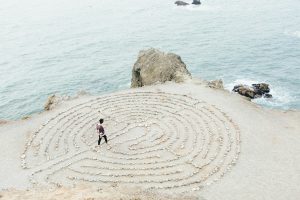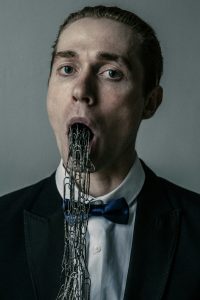Our Ancestors. The Architects of Our Story.
The idea that our ancestors have been architects of our story alludes to a deep relationship between the past and the present. Just as architects plan and build structures, defining their shape and purpose, so too did our ancestors lay the groundwork for our existence. Their choices, life events, and genetic composition have shaped who we are now. We could better appreciate the complexity of human existence and the interconnectedness of all people by learning more about our ancestry.
The ancestors are those who have gone before, all the life that has ever been, leaving behind the traces of kinship. Relics belonging to ancestors are carefully conserved throughout the world. fragments of natural soil, objects used in rituals, or personal items. These artefacts help lessen the pain of death's separation between the living and the cherished dead. In addition to exhibiting immateriality, a response, and introspective serenity that imply they exist in timeless dimensions, ancestors appear to possess a certain kind of materiality and elevated awareness. We imagine the ancestors reside in the Night Sky, Underworld, and Land of the Dead, those are our mythic conceptions of the sacred places of origin.
How would we have survived if we had not been carried on the shoulders of our ancestors? The ancestors enter the realm of dreams and imagination, stepping through the threshold of consciousness to pose inquiries, share wisdom, and reveal the many facets of our identities. They ‘visit’ us in familiar patterns of behaviour as well as inexplicable phenomena, inviting curiosity and engagement.
However, ancestors are not only felt as benevolent. They can act on our psyches as ‘malignant ghosts’, critical and shaming. They ‘haunt’ us if neglected, imposing themselves as fixed beliefs and fear of change or reinterpretation. For some, they represent the way to liberation, in others, they represent endless rebirth.
 What "haunts" are not the spirits of our ancestors in the literal sense. Sometimes, an intergenerational message is present with no way towards verbalisation, creating a sort of gap that can be painfully felt. A psychoanalyst, Galit Atlas, in her book „Emotional Inheritance,” talks about intergenerational secrets and unprocessed experiences that often don’t have a specific voice or image in our minds but still come rushing at us. We may carry within us the losses and traumas of our grandparents or parents that they never had the opportunity to fully articulate. We can feel these traumas, even if we are not consciously aware of them. Traumas that generations of our relatives have gone through can turn into nameless horrors, and untold stories are re-enacted again and again. Psychoanalysts Torok and Nichols call this phenomenon the buried speech of a parent, “a memory that was buried without a legal burial place.” This unknown phantom returns from the unconscious to ‘haunt’ its ‘host’ and may lead to phobias, compulsions, obsessions, or other similar issues specific to the individual. Its effect can persist through several generations and sometimes determine the fate of an entire family line. This segment of Reality is untellable and therefore inaccessible to gradual assimilative psychoanalytic work. This, in turn, creates a space in the ego where 'workings' through and mourning are not happening. Instead, the person may go through periodic states of mania or depression and create a 'fantasmic' identity to mask real suffering.
What "haunts" are not the spirits of our ancestors in the literal sense. Sometimes, an intergenerational message is present with no way towards verbalisation, creating a sort of gap that can be painfully felt. A psychoanalyst, Galit Atlas, in her book „Emotional Inheritance,” talks about intergenerational secrets and unprocessed experiences that often don’t have a specific voice or image in our minds but still come rushing at us. We may carry within us the losses and traumas of our grandparents or parents that they never had the opportunity to fully articulate. We can feel these traumas, even if we are not consciously aware of them. Traumas that generations of our relatives have gone through can turn into nameless horrors, and untold stories are re-enacted again and again. Psychoanalysts Torok and Nichols call this phenomenon the buried speech of a parent, “a memory that was buried without a legal burial place.” This unknown phantom returns from the unconscious to ‘haunt’ its ‘host’ and may lead to phobias, compulsions, obsessions, or other similar issues specific to the individual. Its effect can persist through several generations and sometimes determine the fate of an entire family line. This segment of Reality is untellable and therefore inaccessible to gradual assimilative psychoanalytic work. This, in turn, creates a space in the ego where 'workings' through and mourning are not happening. Instead, the person may go through periodic states of mania or depression and create a 'fantasmic' identity to mask real suffering.
 Does leaving your country to start a new life elsewhere mean abandoning the legacy of your ancestors? Not necessarily. A psychoanalyst and linguist, Julia Kristeva, engages with the topic of being a foreigner in her work “Strangers to Ourselves.” Her own experience of displacement and adaptation, as a Bulgarian immigrant in France, informs her work on the complexities of belonging and otherness. Kristeva explores the figure of the foreigner as both a source of fear and fascination. She argues that foreigners disrupt societal norms and can reveal hidden anxieties within a culture. She writes: “The foreigner comes in when the consciousness of my difference arises, and disappears when we all acknowledge ourselves as foreigners, unamable to bonds and communities.” Kristeva emphasises the constant negation between belonging and alienation. She writes: “Not belonging to any place, any time, any love. A lost origin, the impossibility of taking root, a rummaging memory, the present in abeyance. The space of the foreigner is a moving train, a plane in flight, the very transition that precludes stopping.” Kristeva describes the human condition as specific to a foreigner but also a human being as such. We exist as a split subject that is incoherently divided and fractured. This split is not a psychological flaw but a fundamental condition of human beings. The notion that we can achieve balance and consistency in our lives or discover our true selves is an illusion propagated mainly by the self-help industry and much of the Holywood productions.
Does leaving your country to start a new life elsewhere mean abandoning the legacy of your ancestors? Not necessarily. A psychoanalyst and linguist, Julia Kristeva, engages with the topic of being a foreigner in her work “Strangers to Ourselves.” Her own experience of displacement and adaptation, as a Bulgarian immigrant in France, informs her work on the complexities of belonging and otherness. Kristeva explores the figure of the foreigner as both a source of fear and fascination. She argues that foreigners disrupt societal norms and can reveal hidden anxieties within a culture. She writes: “The foreigner comes in when the consciousness of my difference arises, and disappears when we all acknowledge ourselves as foreigners, unamable to bonds and communities.” Kristeva emphasises the constant negation between belonging and alienation. She writes: “Not belonging to any place, any time, any love. A lost origin, the impossibility of taking root, a rummaging memory, the present in abeyance. The space of the foreigner is a moving train, a plane in flight, the very transition that precludes stopping.” Kristeva describes the human condition as specific to a foreigner but also a human being as such. We exist as a split subject that is incoherently divided and fractured. This split is not a psychological flaw but a fundamental condition of human beings. The notion that we can achieve balance and consistency in our lives or discover our true selves is an illusion propagated mainly by the self-help industry and much of the Holywood productions.
 Language connects us to our ancestors through its development, the preservation of cultural heritage, and genetic links. All languages return to earlier languages and adapt over time through sound changes, borrowing, and cultural exchange. Our ancestors passed on stories, songs, and customs through spoken language, thus preserving their knowledge and values. Family names, regional dialects, and even heritage can provide clues to the origins and migrations of our ancestors. Although many ancient languages have been lost, studying language families and historical linguistics helps us understand how we are connected to those who came before us. Psychoanalyst Sabina Spielrein wondered about the origin of language, reminding us that apart from verbal language, humans have rhythmic and melodic language, gestural language, and the language of the act. The languages based on sound predominate as means of communication and tend to be considered social languages. Spielrein emphasises that people become social beings primarily by using verbal language; however, genetically, verbal language is preceded by other forms of language. Initially, a child expresses their state through the different rhythms, tones, and intensities of their cries through a primitive melodic language. Spielrein wonders if it was an adult who invented a language or a child. She says: “The ancestor sleeps within the child and the child within the ancestor. If the adult really invented the language, he created it in its earliest origins out of the childlike stage of his psyche.” According to Spielrein, this could mean that the language is created in the subconscious, which would take us back to the experiences and processes of the infantile thoughts, which, in turn, would refer to the experience of our ancestors. It is worth remembering that language is complex, making it challenging to pinpoint a single origin of development, as it is in most things in this world.
Language connects us to our ancestors through its development, the preservation of cultural heritage, and genetic links. All languages return to earlier languages and adapt over time through sound changes, borrowing, and cultural exchange. Our ancestors passed on stories, songs, and customs through spoken language, thus preserving their knowledge and values. Family names, regional dialects, and even heritage can provide clues to the origins and migrations of our ancestors. Although many ancient languages have been lost, studying language families and historical linguistics helps us understand how we are connected to those who came before us. Psychoanalyst Sabina Spielrein wondered about the origin of language, reminding us that apart from verbal language, humans have rhythmic and melodic language, gestural language, and the language of the act. The languages based on sound predominate as means of communication and tend to be considered social languages. Spielrein emphasises that people become social beings primarily by using verbal language; however, genetically, verbal language is preceded by other forms of language. Initially, a child expresses their state through the different rhythms, tones, and intensities of their cries through a primitive melodic language. Spielrein wonders if it was an adult who invented a language or a child. She says: “The ancestor sleeps within the child and the child within the ancestor. If the adult really invented the language, he created it in its earliest origins out of the childlike stage of his psyche.” According to Spielrein, this could mean that the language is created in the subconscious, which would take us back to the experiences and processes of the infantile thoughts, which, in turn, would refer to the experience of our ancestors. It is worth remembering that language is complex, making it challenging to pinpoint a single origin of development, as it is in most things in this world.
